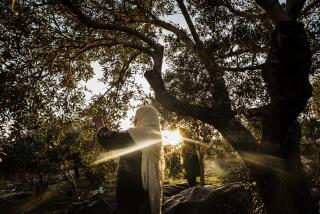Iraq’s Honey Industry Slowly Trickles Back
- Share via
BAQUBAH, Iraq — Alwan Abdal Razzaq, a balding man in a green suit, holds up a vial of opaque fluid.
“This is the queen’s food,” says the 47-year-old beekeeper. “It is $20 for a vial.”
Known here as a miracle cure for everything from arthritis to headaches, royal jelly, the sickly sweet substance that bees feed to a larva to turn it into a queen, is a valuable commodity in rural Iraq, where folk remedies are a common alternative to modern medicine. Especially when modern medicine has become so expensive as to be out of reach for many.
Last year, the 200 members of Abdal Razzaq’s beekeeping association harvested and sold 30 tons of honey at prices ranging from $1,600 a ton to $10,500 a ton, depending on the quality. That’s a strong rebound for an industry that virtually disappeared under the weight of international sanctions during the last decade of Saddam Hussein’s rule.
To the Americans trying to build a new Iraq, men such as Abdal Razzaq, a friendly father of six who keeps 1.2 million bees, are the future. They count on people like him to help break the centuries-old way of doing things, under which graft flourished.
Abdal Razzaq’s work is the sort of “good news story” that often goes uncovered by an international media obsessed with sectarian violence, said Maj. Mike Humphreys, an Army public affairs officer in Baqubah, an agricultural hub of 300,000. Abdal Razzaq is quietly building the foundation of a market-oriented economy that will raise the standard of living for everyone, Humphreys said.
The Iraqi beekeeper’s story, however, is more complicated than a simple case of good news being ignored by the media. The story of the honey industry in Iraq, where beekeepers must contend with violence and the constant government interference that accompanies a country in transition, shows that building an economy while fighting an insurgency is, in the words of one U.S. military officer, “like trying to ride a bicycle while you build it.”
When he started out two decades ago, beekeeping was a good business, even with Hussein in power, Abdal Razzaq said. Beekeepers in Diyala province harvested 300 tons of honey a year and exported it to countries around the world.
Hussein was a bad man, the beekeeper said. But it was safe to travel the highways at night as he transported his bees around the region.
“People don’t realize how important bees are,” Abdal Razzaq said. Without them, plants don’t get pollinated and Iraq’s orchards don’t produce well. The citrus industry is already faced with disease.
Now Abdal Razzaq cannot travel at night because of curfews. When he travels by day, long delays at the more than 400 Iraqi police and army checkpoints around Baqubah expose the bees to the heat.
“Checkpoints slow me down, and the bees die,” he said.
Abdal Razzaq would like to carry a weapon to protect himself and his bees as he takes them from grove to grove along the Golden Road, so named because criminal kidnapping gangs have used it for centuries. But whereas militias and insurgents can lay their hands on machine guns and grenade launchers with little apparent trouble, residents seeking to bear arms are required by the provincial government to obtain a license.
“It used to be that you could smell the trees like perfume all over Baqubah,” he said. With war and privation, the sweet fragrance dancing on the spring air is gone.
But Abdal Razzaq has no intention of giving up his vocation. His attachment to his bees goes far beyond that of a businessman. His affection for bees could almost be called love.
He didn’t set out to be a beekeeper, even though he notes that it’s a noble occupation because bees are mentioned in the Koran. But two decades ago, Abdal Razzaq’s wife fell severely ill, and it was the nectar of bees that saved her, he believes. Right then, he switched professions.
He doesn’t bother with gloves or the protective suits used by beekeepers in the U.S. He gets stung, but shrugs it off.
“You must make friends with them,” he said. “If you feel very comfortable, they will not bite you.”
Abdal Razzaq likes to say that his Sun Rose brand of honey, taken from bees that feed on the lush orange groves planted along the Diyala River, is better than anything U.S. producers sell.
One thing that gives the honey, and the oranges, an extra zest, Iraqi farmers say, is the technique of planting orange trees among date palms.
It was done for practical reasons. The hardy date palms shield the orange trees from the searing summer heat, when temperatures can reach upward of 130 degrees.
But the strategy also allows sap from the palms to drip down on the orange trees, slightly altering the flavor of the fruit.
Asked whether things were getting better or worse in Iraq, Abdal Razzaq didn’t hesitate.
“Worse, because there are no safe hands in Iraq,” he said.
After keeping bees for 21 years, he has started a school to train beekeepers. Last year, he graduated 72 students.
“They aren’t bee men,” he said, “but I train them.”
More to Read
Sign up for Essential California
The most important California stories and recommendations in your inbox every morning.
You may occasionally receive promotional content from the Los Angeles Times.










